Senior Pets: Health & Adoption Awareness
November 7, 2024
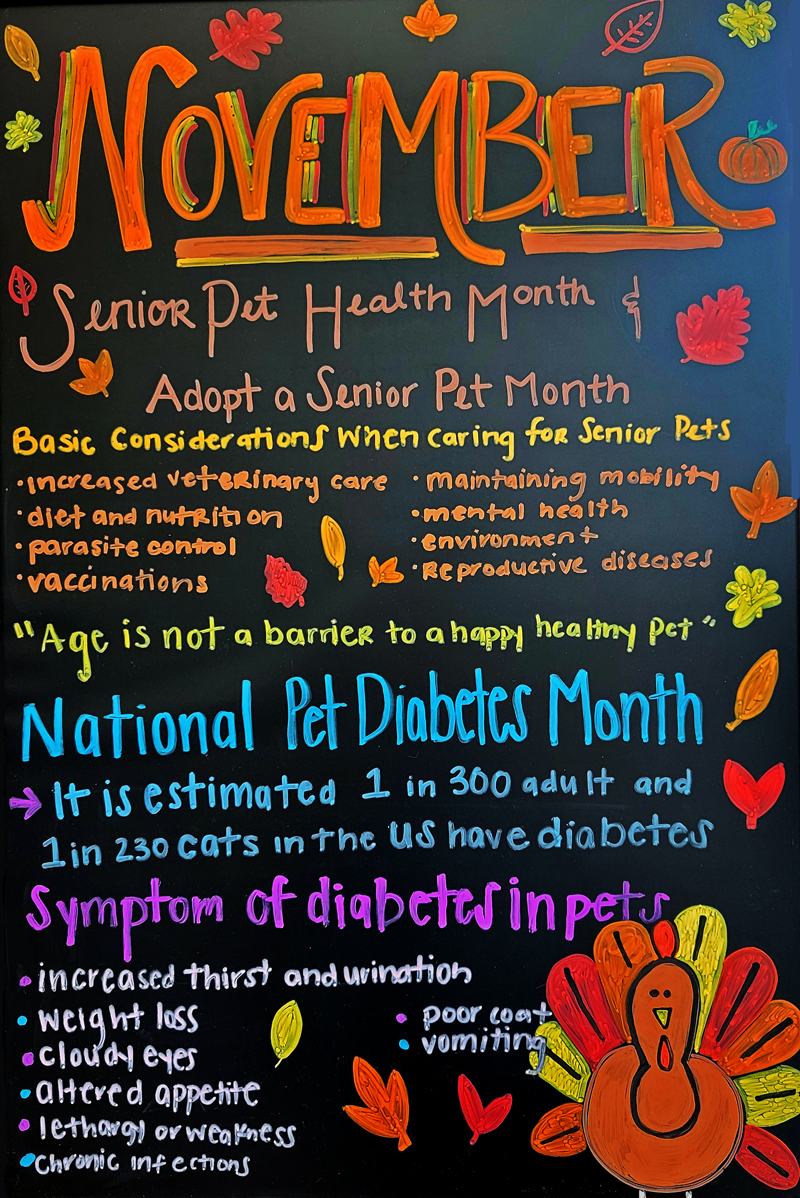
November is Senior Pet Health Month, Adopt-a-Senior-Pet Month & National Pet Diabetes Month
In November, we count our blessings. Which is why we published our list of 10 Reasons to Love Senior Pets. We also know that senior pets benefit from a little more attention to their daily health.
“Age is not a barrier to a happy, healthy pet.”
Basic Considerations When Caring for Senior Pets
As your pet ages, you’ll want to learn more how to care for them in various ways, such as:
- Increased veterinary care
- Diet and nutrition
- Parasite control
- Vaccinations
- Maintaining mobility
- Mental health
- Environment
- Reproductive diseases
Your veterinarian can guide you on the steps to help your senior pet live their happiest, healthiest life. We recommend making an appointment to talk in person and make a plan.
National Pet Diabetes Month
It is estimated that one in 300 dogs and one in 230 cats in the US have diabetes. As your pet ages, you especially want to learn more about this disease. Here are the symptoms of diabetes in pets:
- Increased thirst and urination
- Weight loss
- Cloudy eyes
- Altered appetite
- Lethargy or weakness
- Poor coat
- Vomiting
Previously, we shared more about “Living with Diabetes: Your Pet.” The good news? With proper attention and veterinary care, diabetic pets can enjoy quality lives.
So, if you’re considering adopting a pet, we encourage you to meet a few senior pets. And if you already have a senior pet, give them a hug from us!
Read More
Senior Pets: So Much to Love!
October 29, 2024
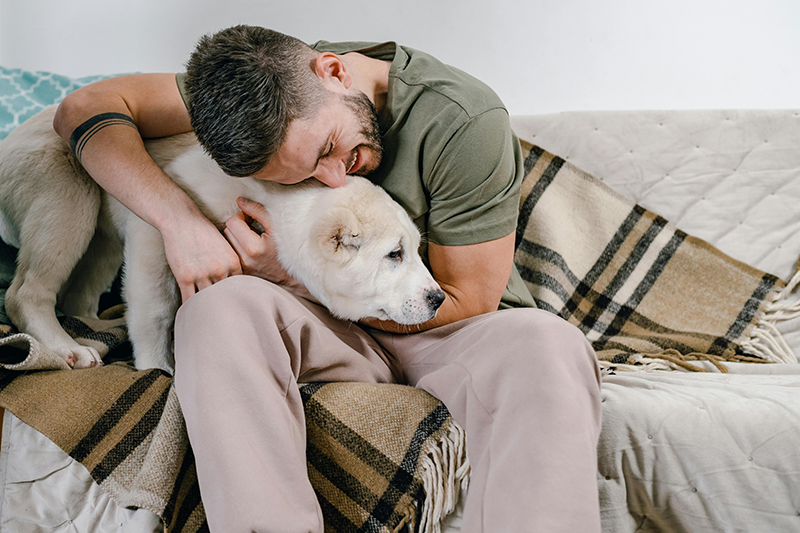
November is National Senior Pet Month
Do you have the joy of a senior pet in your life? If you don’t yet, you will as your cat or dog ages. These golden years are often a beautiful time full of special moments.
Here are 10 reasons we love our senior pets.

- Senior pets have time to cuddle (those younger pets don’t always have the patience!)
- We have years of joy with our senior pets. Cats are considered senior around 10 years of age. Small dogs are also seniors around 10 years, while larger dogs are seniors around 8 years of age.
- Senior pets have had years of life to learn how to show love and affection, i.e., socialization
- Life is calmer with a senior pet, and they usually have outgrown mischievous behavior
- These pets will take naps with you!
- When we’ve shared our life with a pet for many years, we know each other so well. Your pet probably knows what you’re going to do or what you’re feeling better than you do
- Your senior pet has also built up good habits specific to what you care about. For instance, my dog knows the difference between his toys and the kids’ toys
- Senior pets are also wonderful to adopt and start a new relationship with. They are so grateful for the peace and love that come from finding their forever family
- It’s easier to be present and treasure each moment you have with your pet, knowing they are in their sunset years
- We can feel good about giving a senior pet their best life, helping them live happily and healthily. Wild animals don’t get to enjoy “retirement.”
You probably want to add to this list of “Why We Love Senior Pets!” Visit our Facebook page to share your stories and thoughts.
Read More
Adopt a Senior Pet Month
November 13, 2023

Senior Pets Would Be So Thankful to Find a Forever Home in November
We love senior pets! And we would love to introduce everyone to why they are such wonderful additions to many families. Also, we encourage you to visit Animal Adoption Foundation and Animal Friends Humane Society to meet the senior cats and dogs who are seeking forever homes.
Why Adopt a Senior Pet
Here are our top five reasons for adopting a senior pet.
- Calm demeanor: The ups and downs of youth have mellowed out, and senior dogs and cats are more likely to approach life with more reflection
- Physical demands are low: “Walkies” aren’t as long or as far, and exercise needs are much lower. But cuddle needs are higher, yay!
- Already trained: Bringing home a litterbox or house-trained pet is a relief. Also, many of these pets have obedience, leash or other training, too
- You know their size: An already-mature pet won’t outgrow their cages, beds or your backyard
- What you see is what you get: Surprises can be fun, but when you’re blending a new pet into your family, it can be nice to know exactly what the pet is like when you meet them
3 Senior Dogs to Adopt from Animal Friends Humane Society
Get to know more about three of the senior dogs at Animal Friends Humane Society.
Gracie Lynn
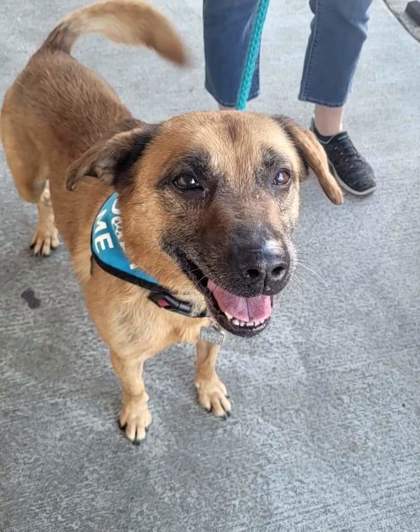
“She’s around 45lbs, rides well in the car, and walks well on a leash. She’s a really nice balance of energy and chill, definitely more chill though. Still gets the zoomies occasionally, but slows down quicker than some other dogs.
She is treat motivated, eager to please, and knows sit. She is potty trained and has good house manners. She’s a great patio buddy!”
Learn more about Gracie Lynn…
Bullet
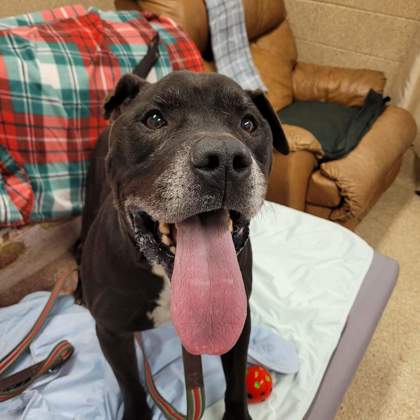
“Play ball with Bullet! This sweet senior says playing ball isn’t just a young pup’s game, in fact fetch in Bullet’s favorite thing in the world and he’d play all the time if he was allowed to! But Bullet has a lot of other favorites too! Like meeting new people (everyone is his friend), taking a leisurely walk, or going for a car ride!”
Learn more about Bullet…
Cheese

“She is quiet and has medium energy. She is housetrained and even knows to ring a bell on the door to ask out! She’s not a fan of the crate but will go in and stay when necessary. She’s a sweet girl, who just really wants to be a part of the family!”
Learn more about Cheese…
2 Senior Cats to Adopt from Animal Friends Humane Society
Bubbles
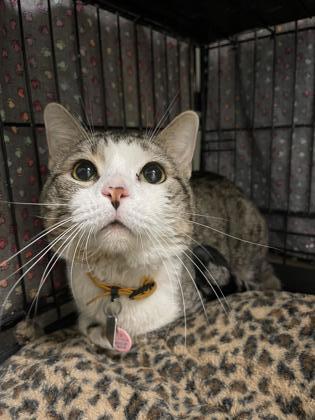
Bubbles is a grey/wheaten shorthair mix cat who is over six years old. He came to the shelter in October.
Learn more about Bubbles…
Topaz
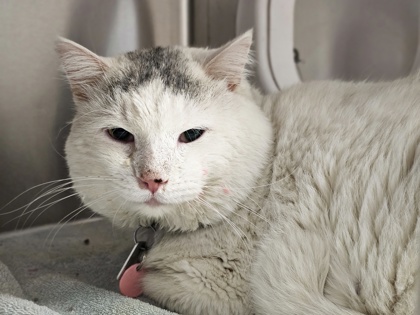
Topaz is a male shorthair mix cat who came to the shelter in October. He’s over six and is white/wheaten.
Learn more about Topaz…
Check out our senior pet care article to learn more about these pets’ special needs. We wish you and your pets much happiness!
Read More
Do You Have Room for a Senior Pet in Your Life?
November 29, 2022
Adoptable Senior Cats & Dogs
Recently, we shared all the many reasons we are thankful for senior pets. If you’re ready to bring a senior pet home and into your heart, here are a few cats and dogs just waiting to meet you.
Animal Friends Humane Society is offering special adoption fees for senior pets, $25 for dogs and $5 for cats.
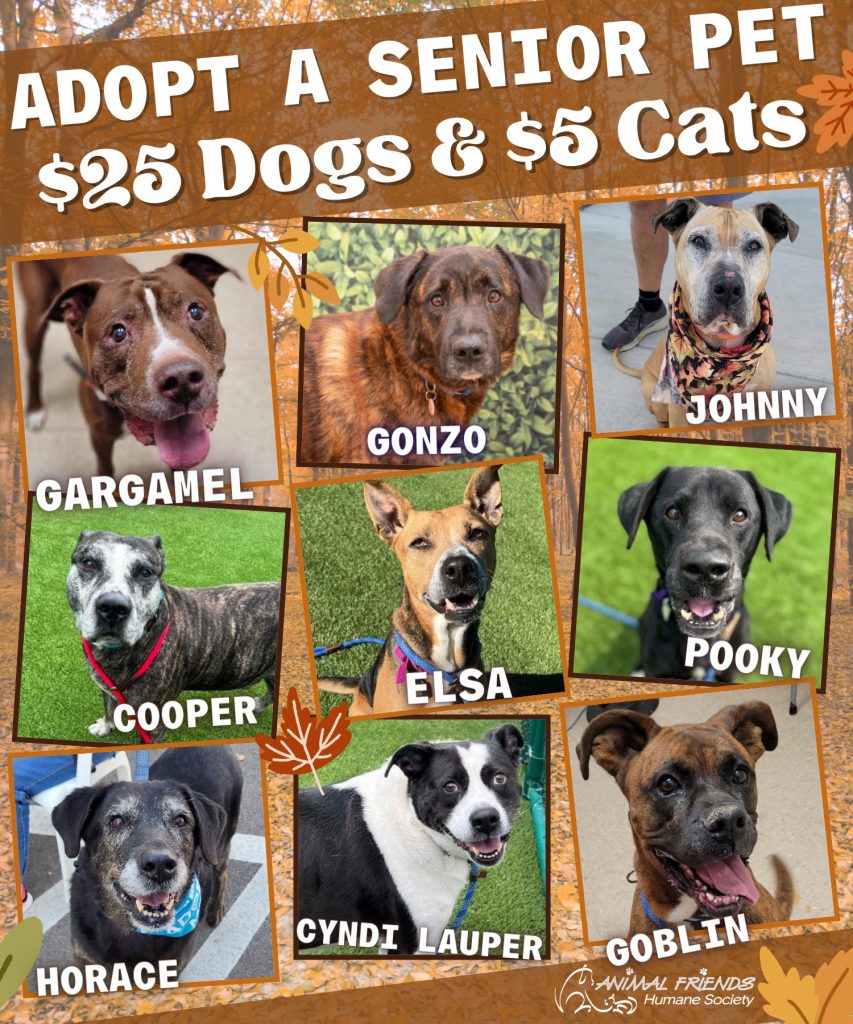
Senior Cats at Animal Friends Humane Society
Learn more about some of the senior (and nearly senior cats) at the shelter. Visit the shelter website to fill out an adoption application and get their operating hours.
Beth Dutton
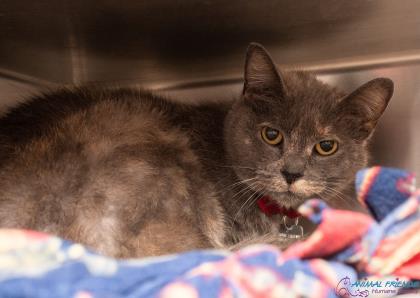
This domestic medium hair female is almost 8 years old. She’s been at the shelter since November of this year.
Sassy
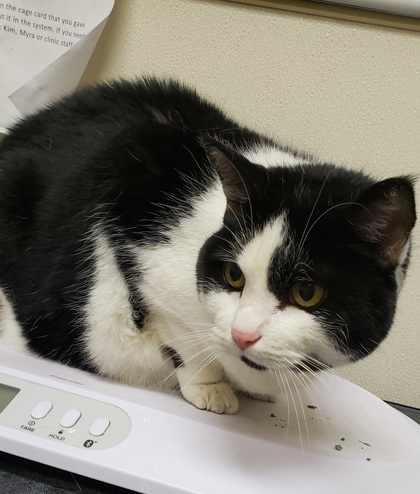
This 11-year-old girl also came to the shelter in November 2022. She’s a black-and-white domestic long-hair who was declawed sometime during her life.
Khloe
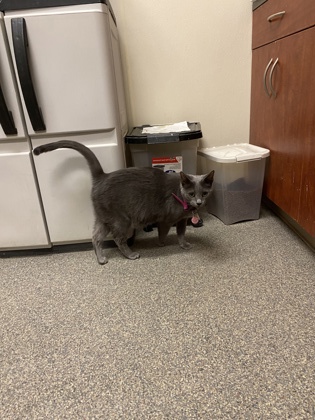
Another of our November arrivals, she’s 11 years old, and a beautiful grey shorthair.
Bandit
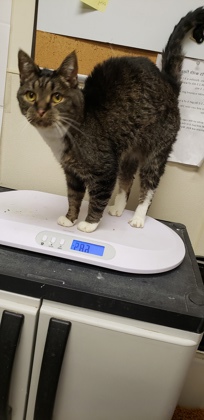
This male domestic shorthair is only 7 years old. He has beautiful markings and striking, tawny eyes.
Senior Dogs at Animal Friends Humane Society
There are plenty of great senior dogs at the shelter. Here are just a few. To fill out an adoption application and learn more, visit the shelter website.
Gargamel
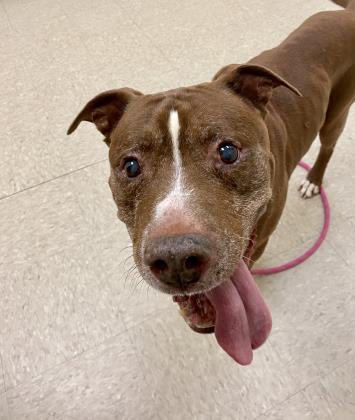
He’s 10 years old, brown with white paws and is a smart cookie. He knows a lot of tricks and enjoys the company of other dogs (as long as they respect his age).
Horace
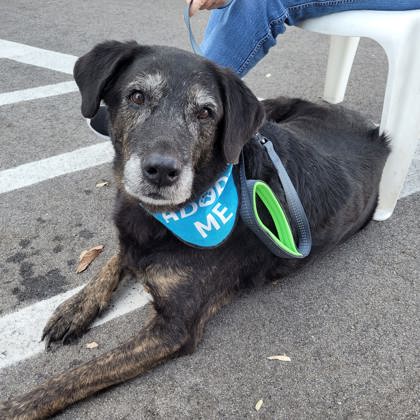
This black/brown retriever mix has been a shelter resident since September. He’s 9 years old and a very sweet boy.
Lexi Jo
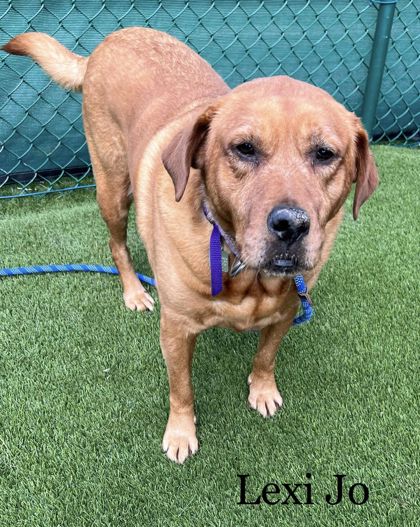
She’s 10 years old and looking for a relaxing home for her golden years. A red retriever/labrador mix, she’s laid back and doesn’t cause any trouble.
Gator
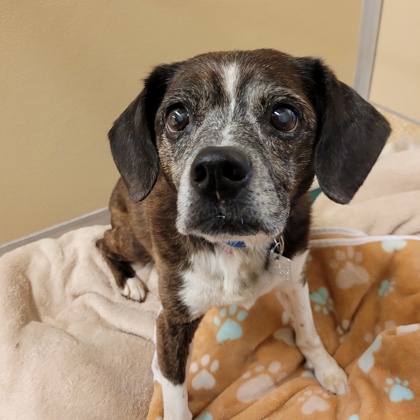
She’s 15 and a Boston terrier mix who is ready to mingle! She loves being outdoors and enjoys short walks.
We hope you feel a connection with one of these senior pets! They appreciate love and a stable home more than the “young pups” and can’t wait for a cuddle.
Read More
Cancer in Dogs: Large Dogs Face Higher Risk
November 8, 2022

National Pet Cancer Awareness Month
Fortunately, cancer is not one of the Most Common Reasons Pets Visit the Vet. But still, an estimated 12 million US cats and dogs are diagnosed with cancer each year. Recent research on cancer in dogs has dramatically improved our understanding, which will help future prevention and treatment.
Nationwide Insurance conducted this research by analyzing its over 1.35 million pet insurance claims from 2021. In a focus on dogs, we learn:
- In seniors, diabetes and pancreatitis affect toy and small dogs at a significantly higher rate
- Toy and small dogs have a higher risk of heart disease across age groups
- Large and extra-large dogs are at a higher risk of developing cancer
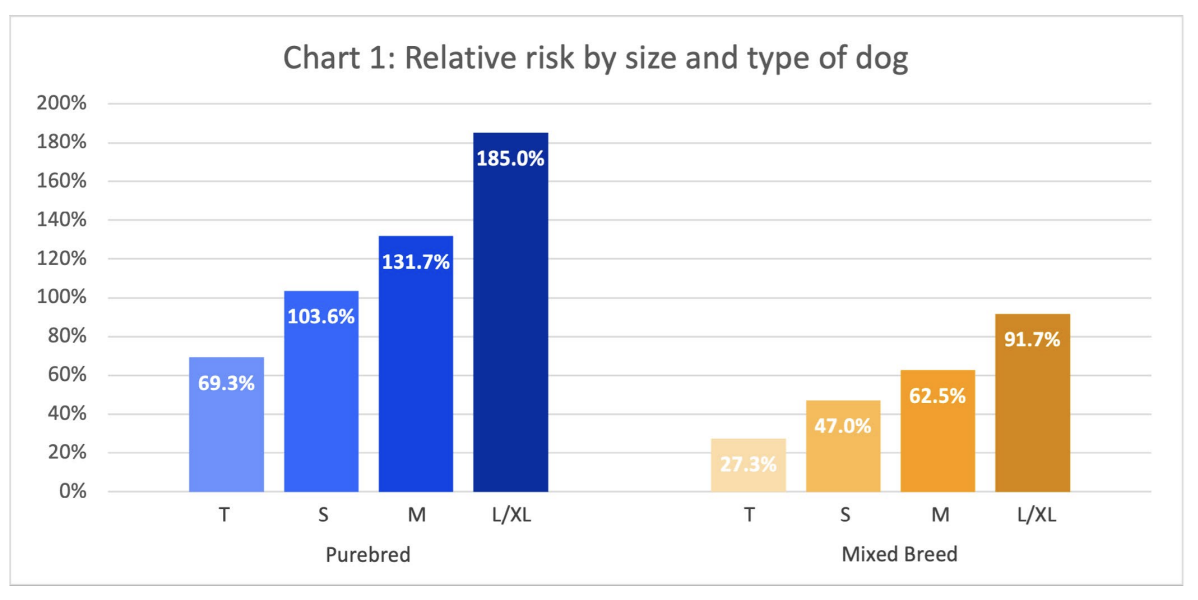
Cancer in Dogs:
The Risk to Large Purebred Dogs
The dogs most at risk of developing cancer are large and extra-large purebred dogs. A large purebred dog has twice as much risk as a large mixed-breed dog.
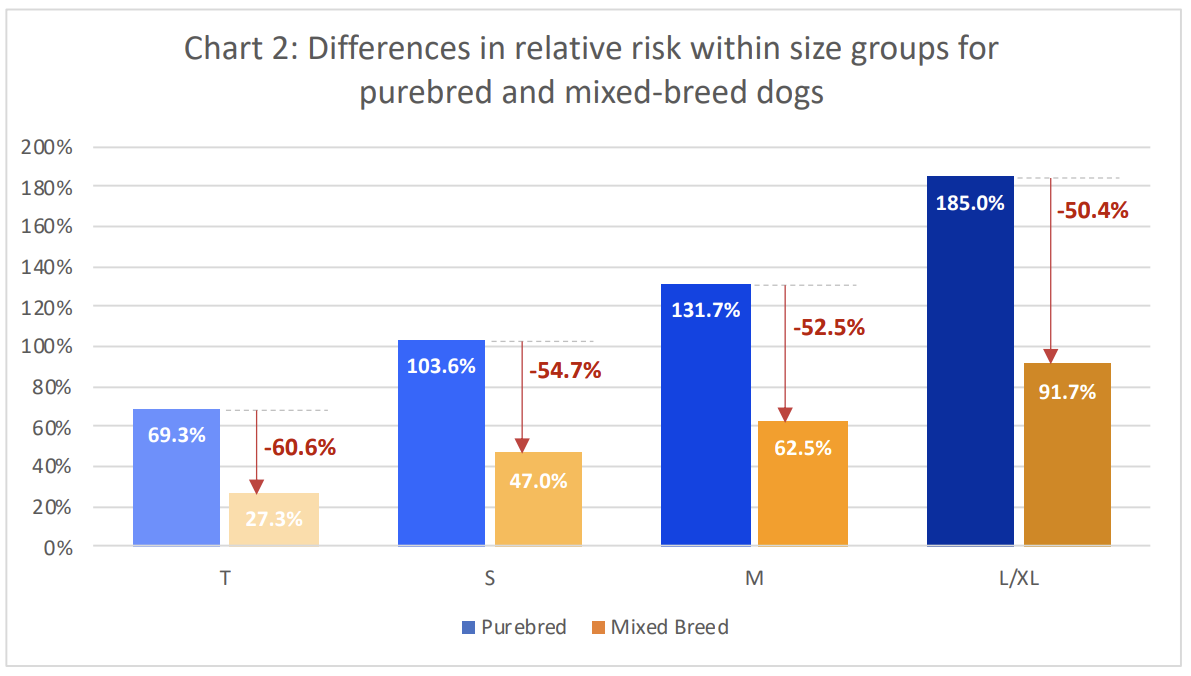
Cancer in Dogs:
The Risk to Large Mixed-Breed Dogs
Last year, we reported on preliminary research findings: “New Research Sheds Light on Cancer in Pets.” It’s true that overall, cancer treatment claims for mixed breed dogs are 48% less likely. Which is great news for our beloved mutts.
However, larger mixed-breed dogs are at a higher risk compared to toy or small mutts. Regardless of your dog’s genetic makeup, a larger dog is more likely to develop cancer at some point in their life.
Cancer in Dogs:
Types of Cancer
Cancer can affect any body system. Not all cancers are the same. The research tracked these five cancers:
- Bone
- Liver
- Lymphatic
- Mammary
- Spleen
You can get a sense of which kinds of dogs are affected most by which types of cancer with this chart.
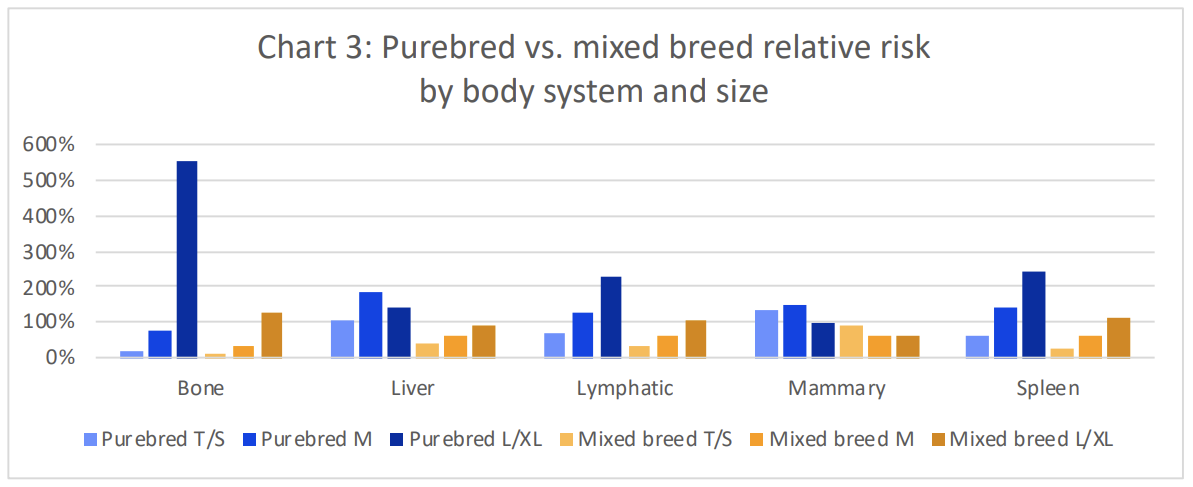
Cancer in Dogs:
What Pet Owners Need to Know
Understanding your dog’s cancer risk in more detail will help you stay alert to possible early symptoms and signs. For instance, medium-sized purebred dogs seem to have the highest risk for liver cancer.
Nationwide lists these possible actions based on the evidence:
“Determining when wait-and-see may not be the best approach – Large and extra-large dogs are at increased risk of bone cancer as early as six years old, and knowing what to look for could drive meaningful differences to pet health outcomes.
“Identifying an evidence-based approach to routine diagnostics – Pet families with medium, large and extra-large dogs may want to consider routine diagnostics from age eight or younger to catch liver cancer early.
“Raising the awareness of middle-aged canine cancers – Nationwide data confirm that lymphatic cancers (e.g., lymphoma) are a significantly higher relative risk than other forms of cancer for dogs in their middle years.”
Visit our list of common warning signs of cancer in dogs to learn what symptoms to look out for. And talk to your vet about this new research to tailor a prevention plan for your dog.
Read More
Senior Pet Health Month in September
September 13, 2021
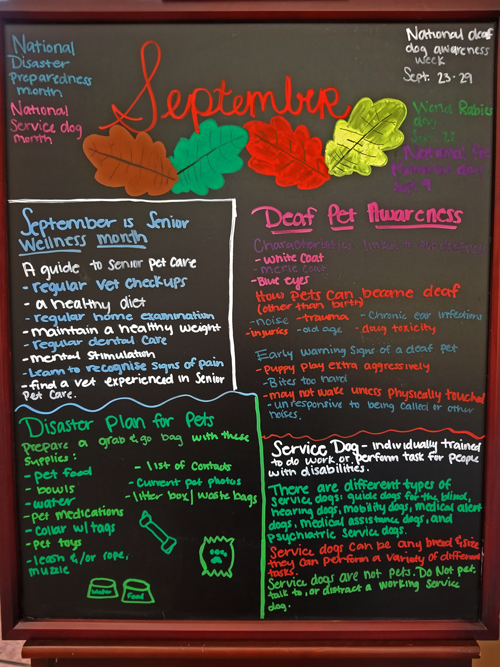
We Love Senior Pets!
During Senior Pet Health month, count your blessings if you have a senior animal for companionship! Here are a few reasons we love senior pets:
- Animals tend to mellow as they age, relaxing from the energy highs from when they were a puppy or kitten. Life with a senior pet is a little more chill.
- And while we’re chilling, we can cuddle! Senior pets are more likely to want to snuggle up for longer.
- You both know each other better and have a deeper friendship than at the beginning. It’s great to be with a cat or dog who truly seems to understand you.
- No more house training or litter box training. Need we say more?
- Looking forward to more adventures together. Life’s not over just because you have a little grey in your fur!
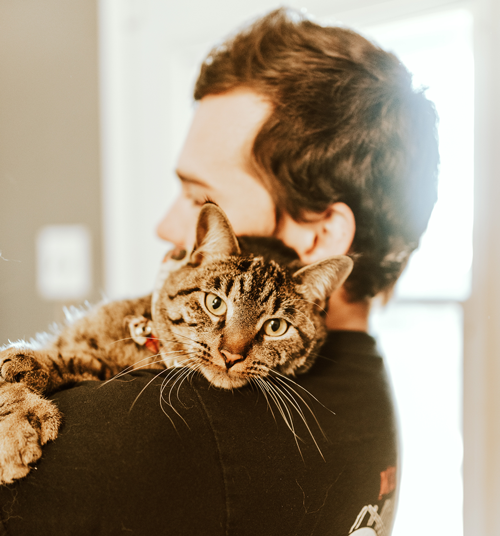
Senior Pets by the Numbers
The AVMA offers this helpful chart to gauge the relative “age” of your pet in human terms. This helps us understand what special care might be expected as animals age.
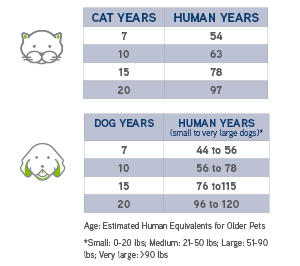

How to Help Your Senior Pet Live Their Best Life
A little extra care and attention to wellness can help your senior dog or cat live longer and more healthy lives.
- More Wellness Visits: Older pets should visit their veterinarian twice a year for wellness exams.
- Lab Work: Blood work and other labs can help catch health concerns before they become major.
- Diet and Nutrition: Older pets needs high-quality food that is more easily digested.
- Weight: Maintaining a healthy weight is important for longevity. Older dogs are prone to weight gain, while older cats tend to lose too much weight.
- Exercise: Keeping your older pet active can help them maintain their mobility.
- Comfort Considerations: Older pets may need beds and cushions on the floor, as they become less able to jump on furniture or climb stairs.
Have questions about your senior cat or dog? Contact us.
Read More
Help Your Cat or Dog Enjoy Their Golden Years
September 1, 2020
September is Senior Pet Wellness Month
We love our senior pets and want to ensure they receive the best care for the highest-quality life. A happy pet makes a happy person! During Senior Pet Wellness month, make a plan for continued wellness for your cat or dog as they age.

Signs of Illness in Senior Pets
With senior dogs and cats, it’s important to call your veterinarian right away if notice any of these symptoms of illness:
- Unexpected weight loss or gain
- Decreased appetite
- Increased water consumption
- Changes in urination or defecation behavior
- New lumps or bumps
- Coughing
- Rapid breathing or difficulty breathing
- Unexpected collapse or weakness
- Difficulty jumping or climbing stairs
- Drooling or bad breath
- Convulsions or seizure
- Apparent disorientation
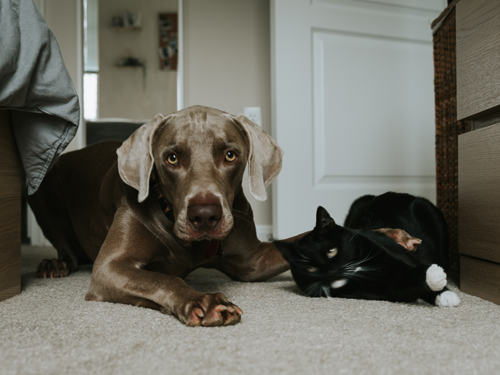
Vet Street explains why we need to pay special attention to our senior pet’s health:
Unfortunately, many signs of health problems, including cognitive changes, urine leakage and slow movements, are misinterpreted by pet owners as a normal part of aging. But dismissing these signs can result in a missed opportunity to help your pet. If you notice any of the above symptoms or other changes in your pet’s normal behavior, it’s important to report them to your veterinarian as soon as possible.
Read More
9 Health Concerns to Watch for in Senior Pets
September 11, 2019
September is Senior Pet Wellness month, and we love senior pets! As your pet ages, there are several health considerations to be mindful of. The American Veterinary Medical Association has a helpful list for all of us with senior pets.
 Increased Veterinary Care: Geriatric pets should have semi-annual veterinary visits instead of annual visits so signs of illness or other problems can be detected early and treated. Senior pet exams are similar to those for younger pets, but are more in depth, and may include dental care, possible bloodwork, and specific checks for physical signs of diseases that are more likely in older pets.
Increased Veterinary Care: Geriatric pets should have semi-annual veterinary visits instead of annual visits so signs of illness or other problems can be detected early and treated. Senior pet exams are similar to those for younger pets, but are more in depth, and may include dental care, possible bloodwork, and specific checks for physical signs of diseases that are more likely in older pets.- Diet and Nutrition: Geriatric pets often need foods that are more readily digested, and have different calorie levels and ingredients, and anti-aging nutrients
- Weight Control: Weight gain in geriatric dogs increases the risk of health problems, whereas weight loss is a bigger concern for geriatric cats.
- Parasite Control: Older pets’ immune systems are not as healthy as those of younger animals; as a result, they can’t fight off diseases or heal as fast as younger pets
- Maintaining Mobility: As with older people, keeping older pets mobile through appropriate exercise helps keep them healthier and more mobile.
- Vaccination: Your pet’s vaccination needs may change with age. Talk to your veterinarian about a vaccination program for your geriatric pet.
- Mental Health: Pets can show signs of senility. Stimulating them through interactions can help keep them mentally active. If any changes in your pet’s behavior are noticed, please consult your veterinarian.
- Environmental Considerations: Older pets may need changes in their lifestyle, such as sleeping areas to avoid stairs, more time indoors, etc. Disabled pets have special needs which can be discussed with your veterinarian
- Reproductive Diseases: Non-neutered/non-spayed geriatric pets are at higher risk of mammary, testicular, and prostate cancers.
Read More
When Pets Are Deaf
September 18, 2018
Deaf Dog Awareness week is September 23-29. Many pet owners know that older pets are at a higher risk of becoming deaf, but cats and dogs can also be born unable to hear, or develop deafness from their environment.
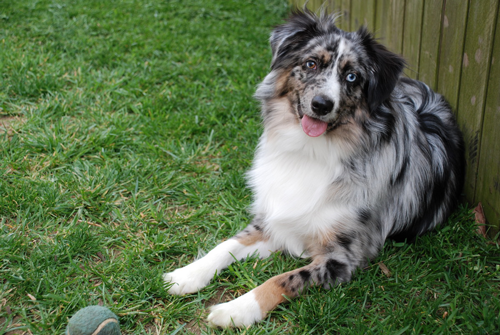 Risk Factors for Deafness in Animals
Risk Factors for Deafness in Animals
These characteristics in cats and dogs increase the likelihood the animal was born deaf:
- White coat
- Merle coat
- Blue eyes
Environmental Causes of Deafness in Animals
There are several ways a pet could become deaf, other than being born that way.
- Exposure to loud noises
- Trauma
- Chronic ear infections
- Injury
- Old age
- Drug toxicity
 Early Warning Signs of a Deaf Pet
Early Warning Signs of a Deaf Pet
Watch for these symptoms and make an appointment with your veterinarian if you notice:
- Puppy play that is very aggressive
- Play bites that are too hard
- May not wake unless physically touched
- Unresponsive to being called by name
- Unresponsive to other noises
Read More
September is Senior Pet Wellness Month
September 10, 2018

We Love Senior Pets!
 Whether your pet has been your faithful companion for many years or you adopted a pet in their golden years, a senior pet is special. An older cat or dog has a calmer demeanor and is less physically active. Cuddles on the couch last that much longer with a “seasoned” pet! Here are 10 Reasons We Love Senior Pets.
Whether your pet has been your faithful companion for many years or you adopted a pet in their golden years, a senior pet is special. An older cat or dog has a calmer demeanor and is less physically active. Cuddles on the couch last that much longer with a “seasoned” pet! Here are 10 Reasons We Love Senior Pets.
Seniors also require special care to keep them healthy and happy well into the future. Cats become seniors around nine years of age, while dogs are considered seniors at just seven years.
 A Guide to Senior Pet Care
A Guide to Senior Pet Care
Follow these guidelines for the health of your senior dog or cat:
- Regular vet check-ups: Health problems can develop quickly with seniors and are important to identify early.
- Regular home examination: Take note of any physical or mental changes and discuss with your vet.
- A healthy diet: Maintaining a healthy weight is important to avoid diseases senior pets are susceptible to.
- Regular dental care: Keeping teeth healthy helps your pet maintain their overall health longer. Diseased teeth can lead to overall health problems.
- Mental stimulation: A mentally engaged pet will be healthier and happier, plus play is fun for both of you!
- Learn to recognize the signs of pain: Read our article, the Most Common Signs of Pain in Your Pet.
- Find a veterinarian experiences in senior pet care.
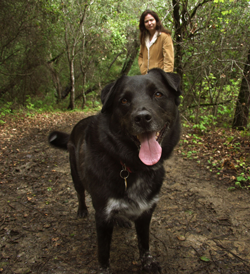 Adopt a Senior Pet
Adopt a Senior Pet
Check out some great senior pets up for adoption at Animal Friends Humane Society and Animal Adoption Foundation. Both no-kill shelters have some great local events coming up, where you might meet your next best friend!
Read More






























 Increased Veterinary Care: Geriatric pets should have semi-annual veterinary visits instead of annual visits so signs of illness or other problems can be detected early and treated. Senior pet exams are similar to those for younger pets, but are more in depth, and may include dental care, possible bloodwork, and specific checks for physical signs of diseases that are more likely in older pets.
Increased Veterinary Care: Geriatric pets should have semi-annual veterinary visits instead of annual visits so signs of illness or other problems can be detected early and treated. Senior pet exams are similar to those for younger pets, but are more in depth, and may include dental care, possible bloodwork, and specific checks for physical signs of diseases that are more likely in older pets. Risk Factors for Deafness in Animals
Risk Factors for Deafness in Animals Early Warning Signs of a Deaf Pet
Early Warning Signs of a Deaf Pet Whether your pet has been your faithful companion for many years or you adopted a pet in their golden years, a senior pet is special. An older cat or dog has a calmer demeanor and is less physically active. Cuddles on the couch last that much longer with a “seasoned” pet! Here are
Whether your pet has been your faithful companion for many years or you adopted a pet in their golden years, a senior pet is special. An older cat or dog has a calmer demeanor and is less physically active. Cuddles on the couch last that much longer with a “seasoned” pet! Here are  A Guide to Senior Pet Care
A Guide to Senior Pet Care Adopt a Senior Pet
Adopt a Senior Pet